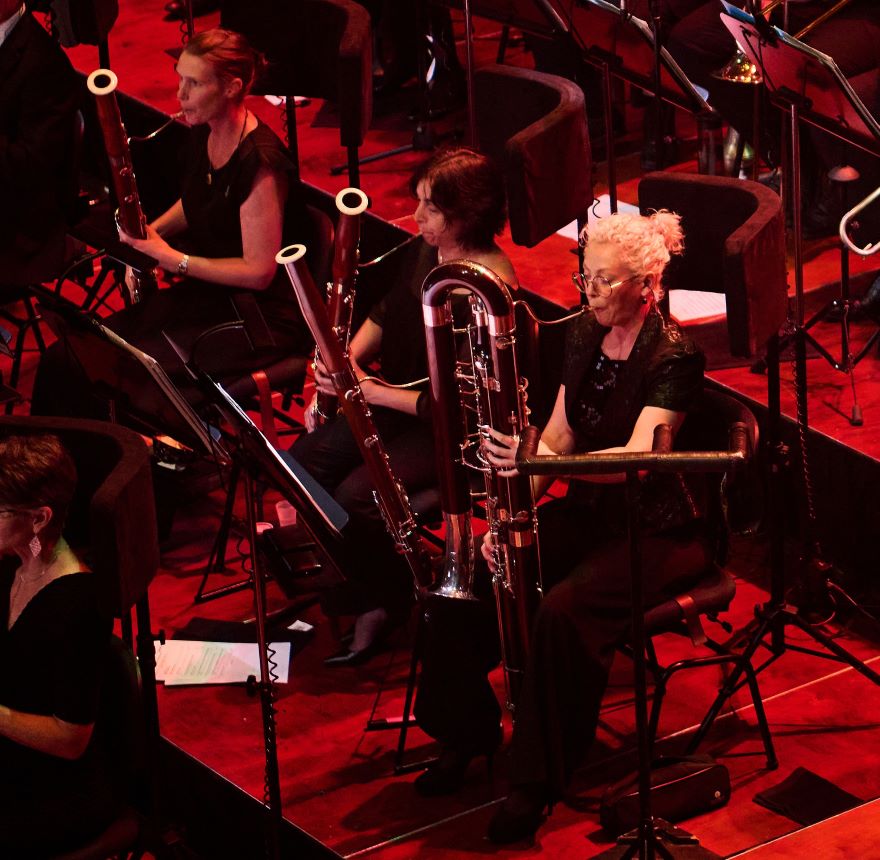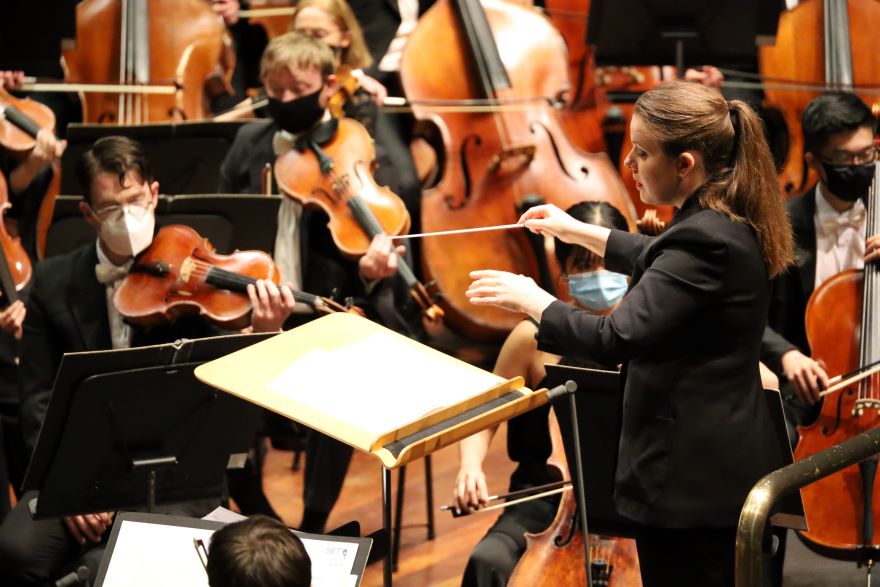How do you keep an orchestra on stage during a pandemic, when a sforzando from a trumpet player could potentially put the entire ensemble in isolation? Rosalind Appleby discovers the extraordinary efforts being made by the West Australian Symphony Orchestra to keep the orchestra playing.
The show must go on
23 March 2022
- Reading time • 9 minutesMusic
More like this
- Rewriting tradition with skill and charm
- Close encounter stirs the soul
- The great unknown
The staff and musicians at the West Australian Symphony Orchestra (WASO) are going to extraordinary lengths to ensure that the show will safely go on for everyone, as they endeavour to continue with scheduled concerts this year. Orchestras are used to working as a team but now everyone from assistant conductor to contrabassoonist is stepping up to so the music can continue.
The risks are substantial with a virus that is spread through moisture droplets in the air. What if an entire instrument section tests positive for COVID-19 just a few days out from a concert?
In fact that is what very nearly happened earlier this month. Two WASO bassoon players had to withdraw with COVID-related complications the night before rehearsals commenced for the orchestra’s opening concert in the Masters Series.
WASO’s Contrabassoon quandary
On Tuesday morning contrabassoonist Chloe Turner found out on her way to rehearsal that she would need to step into the principal bassoon seat and perform the opening of Stravinksy’s iconic symphony The Rite of Spring, one of the most famous and challenging solos in the repertoire.

“It was one of the most stressful moments of my career!” Turner admits. “Normally people make reeds specifically for this solo and do a lot of preparation. I found out at 9am that I had to play it at the 10am rehearsal. But you reach a point where you can’t be any more stressed so you just have to do it, and go with the adrenalin.”
Which is exactly what she did, nailing the solo and receiving a spontaneous outburst of applause from her colleagues.
“Chloe was an absolute trooper,” confirms Keith McGowan, executive manager of the orchestral management team. “She had no preparation, gave the solo a crack and it was incredible.”
The orchestra managed to secure bassoonist Brock Imison from the Melbourne Symphony Orchestra who jumped on the first plane and arrived in time for the final rehearsal and concerts. The remainder of the five-strong bassoon section required for The Rite of Spring was supplied by casual players and students, and the show went on.
New health measures implemented just in time
Fortunately the orchestra had instigated a new level of health strategies in that first week of rehearsals which enabled them to manage the situation smoothly.
“We’ve had a couple of years of living and adapting to COVID so we are accustomed to operating in a constant state of uncertainty,” explains McGowan, confirming that all musicians and WASO employees must be fully vaccinated in order to enter the Perth Concert Hall. “Safety is our number one priority. As we saw community cases increase we implemented new levels of risk management.”
The new measures include Rapid Antigen Tests for all staff and musicians entering the rehearsal space, which is how the COVID case was identified and a close contact situation was avoided. The musicians are provided with a kit of tests and wind and brass players (those with the highest risk profile) are tested every evening, strings and percussion every second evening.
Extra hygiene measures include daily disinfecting chairs, stands and equipment, and the provision of black towels (laundered daily) for brass and wind players to empty the condensation from their instruments.
The orchestra has also restricted access to the venue, with all non-essential staff and guests banned from the backstage area, minimising their contact as much as possible with the musicians and backstage surfaces.
Mask wearing has also been implemented and even wind and brass players must wear masks whenever they are not playing.
“It was a bit odd the first rehearsal,” says Assistant Conductor Jen Winley. “We took extra breaks in rehearsals. Violin players had to find masks that they could wear that didn’t get pushed over their eyes when they put their violin under their chin.”
Winley steps in from the wings
Winley joined the orchestra at the beginning of the year and has quickly become an essential part of the team. Her initial schedule included conducting several concerts during the year including an education concert in May, and participating in mentoring workshops with Principal Conductor Asher Fisch. She is also required to be on standby in case a conductor is unable to perform. However COVID complications have meant Winley has had to step in from the wings several times already this year due to Western Australia’s extended border closure.

“So far I’ve been on the podium four out of five weeks! The first time I conducted WASO I was terrified, especially with my partner [cellist Nicholas Metcalfe] in the orchestra. I just didn’t want to be terrible. But now there is no time to be nervous.”
The learning curve has been intense but exhilarating as every week she has had to learn the technique required for a new lot of repertoire.
“There are times of feeling utterly overwhelmed trying to manage an unexpectedly busy schedule. I take half a day off a week to have a break and walk the dogs. It is exhausting. But there is also a mindfulness element to music; when I am rehearsing I can’t think of anything else.”
“We are so lucky to have Jen,” says McGowan. “She’s incredible and the band have been so supportive, they gel really well with her. Having her here provides a level of comfort for the musicians. If we lose Asher or another scheduled conductor there is someone prepared.”
It comes at a cost
Aside from the emotional toll, the financial cost of the extra hygiene measures is also significant. The daily RAT requirements alone cost WASO up to $2000 a week. And that is alongside the hit taken from lost ticket sales from the 50% capacity restrictions currently in place at the Perth Concert Hall.
“But by [implementing these safety measures] we are protecting our revenue,” says McGowan. “We are protecting our ability to take up the 50 percent revenue. If the capacity limits stay in place for the entire year we would be operating at a loss. We are hoping it will wind back soon, but we exist for our audience so in the meanwhile to the greatest extent we can we want to give our audience what it says on the tin.”
“COVID is very stressful,” agrees Turner. “I’ve noticed this week the bass section has players dropping out and new casuals every day. And it is strange seeing the hall only half full. It is so much effort for only half an audience. But we are a chipper bunch, we just get on with it.”
Fortunately, Turner says, orchestral players are used to managing pressure and working as a team.
“It’s in our nature anyway. We are very sensitive to each other, constantly listening, blending with each other, trying to make everyone sound their best. We know that respecting the rules is how to make a team work and we don’t want to be the weak link. It’s what we do.”
WASO’s next concert is ‘Vivaldi’s Four Seasons’, 31 March – 2 April.
Pictured top: Asher Fisch and the musicians of the West Australian Symphony Orchestra on stage for last week’s ‘Tchaikovsky Pathetique’. Photo: Daniel Grant
For the latest news and reviews, subscribe to Seesaw’s fortnightly free e-magazine here.
Like what you're reading? Support Seesaw.






